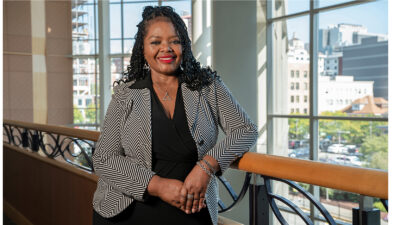LaJuana Fuller knows how critical early detection can be in catching and treating breast cancers before they become fatal, but many women do not get the mammograms they need.
That’s why she’s worked to bring health events to regions throughout Pittsburgh to make getting care more convenient.
At least a dozen times a year, Fuller, director of Womens Imaging and Chair of Diversity and Inclusion Initiatives with UPMC Magee-Womens Hospital, brings screening Community Health Fair events to familiar gathering places including churches, the result of a collaboration at UPMC among many departments.
There’s been screenings in Wilkinsburg, McKeesport, and the Pittsburgh neighborhoods of East Liberty and West End.
“We definitely look to partner with areas where there’s an identification of lower screenings,” Fuller said. “I think that what’s crucial is that we are flexible to wherever the community may be, and to accommodate that. … We are very amenable to tailoring things to the needs of whoever it may be.”
According to the American College of Radiology, patients from racial minority populations are 72 percent more likely to develop invasive breast cancer before age 50, due in part to limited access to screening.
Though mobile screenings and mobile mammography have been available since at least the 1960s, the options are becoming more prevalent throughout the country, with funding from the federal government for some programs.
In Pittsburgh, women who come to the events can make an appointment to get a future mammogram, or in some cases, they take a shuttle to a UPMC facility to get a routine screening mammogram that same day.
Getting those mammograms done is the focus, but these community events go further and offer education and other health screenings, since patients are already there. Professionals will give on-site presentations about maintaining breast health and detecting breast cancer. Other services often are available, too, like giving vaccines, testing for diabetes and cholesterol levels, and testing blood sugar.
“We will never stop discussing the importance of breast cancer screening.” — LaJuana Fuller, director of Womens Imaging and Chair of Diversity and Inclusion Initiatives with UPMC Magee-Womens Hospital
Some women who have no insurance come to the events, but they can still get mammogram coverage, Fuller said. Women who are having symptoms of breast cancer, like a lump or nipple discharge, cannot get a more extensive diagnostic mammogram that day, but staff members can help them get scheduled for another time.
“If someone comes and says, ‘I have this lump in my breast,’ we’ll still do our best to [support them],” Fuller said.
UPMC began offering this service several years ago before the COVID-19 pandemic began. Then, as people became grounded at home, UPMC started offering a virtual education series for patients. Now, as in-person gathering has resumed, the program has continued to grow, Fuller said.
“One thing that COVID taught us is that people have their specific needs,” she said. “In consideration of that, we continued to expand.”
While patients can get information about screening events from the UPMC website and search for mammogram events, Fuller said she’s had success spreading information through word of mouth.
She recalls one woman who came in for one event, and she took some educational material home with her. She then invited members of her church, and they came to the next event in that area. She hears from women who come to events with friends for a ladies’ day out. Spreading the word informally works well in a place like Pittsburgh, Fuller said.
“Pittsburgh is a big small town,” she said. “You can think about it as a big city, but it’s a small city.”
Fuller has heard many touching stories from grateful patients, including women who say that thanks to the screening event, they got a mammogram and caught cancer in time to treat it in the early stages. She has met a breast cancer survivor who is soon to be 100. The woman was diagnosed at 80, and then had a recurrence at age 90.
“It was a beautiful, heartwarming testimony,” Fuller said.
Scheduling and getting mammograms helps reduce mortality from breast cancer. This is the second most common cancer among women in the United States, and Black women die more often from the disease than white women, according to the Centers for Disease Control and Prevention.
In 2020, the most recent year for which data are available, 239,612 women were diagnosed with new cases of breast cancer, and 42,273 women died from it.
“We will never stop discussing the importance of breast cancer screening,” she said.
Listen to the Good Health, Better World podcast for more conversations about empowering women in their health care journey. Find it wherever you get your favorite podcasts.







